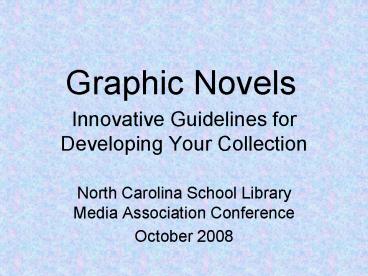Graphic Novels - PowerPoint PPT Presentation
1 / 16
Title:
Graphic Novels
Description:
Manga (mahn-gah) Japanese word for comic book. Comics originally published in Japan. ... Manga sub-categories. Shojo young teenage girls. Shonen young ... – PowerPoint PPT presentation
Number of Views:361
Avg rating:3.0/5.0
Title: Graphic Novels
1
Graphic Novels
- Innovative Guidelines for Developing Your
Collection - North Carolina School Library Media Association
Conference - October 2008
2
BackgroundJuly 2008 NCSLMA and DPI
- Developed criteria
- Curriculum support
- Resources for collection development
- FAQs
3
Definition
- . . . an original book-length story, either
fiction or nonfiction, published in comic book
style . . . or a collection of stories that have
been published previously as individual comic
books . . .
Gorman, Michele. Getting Graphic! Using Graphic
Novels to Promote Literacy with Pre-Teens and
Teens. Worthington OH Linworth Publishing Inc,
2003.
4
Graphic Novels Can Include
- Stand-alone titles
- Ongoing Series
- Periodicals
- Old favorites in a new format
5
Vocabulary
- Manga (mahn-gah) Japanese word for comic book
- Comics originally published in Japan.
- Read right to left
- Serials
- Manga sub-categories
- Shojo young teenage girls
- Shonen young teenage boys
- Kodomo children
6
Vocabulary
- Anime (ah-nee-may)
- Animated films produced in Japan
- Includes feature films, TV shows, and video
animation (OVA)
7
Comics and graphic novels are a FORMAT not a
GENRE! Any genre may appear in the comic format.
8
Gaining Popularity faster than a speeding
bullet
- 2007 overall estimated GN sales - 375 million
(Reed Bus. Information, 2007) 12 - Scholastic Book Fair GN sales since 2004 4
million (Reed Bus. Information, 2007) - Public libraries report 25 increases in overall
circulation after adding graphic novels to their
collections (Miller, 2005)
9
Awards and Recognition
- New YALSA Award for graphic novels
- Maus (Spiegelman) Pulitzer Prize
- American Born Chinese (Yang) Printz Award,
National Book Award Finalist, 2007 Top Ten Best
Books for Young Adults (YALSA) - To Dance (Siegel) 2007 Robert F. Sibert Honor
Book
10
What Does Krashen Say?
- 20 more rare vocabulary than a typical chapter
book (Krashen, 1993). - Beneficial to ELL and lower level readers
(Krashen, 1996) - Help develop a taste for reading/bridge to other
literature (Krashen, 1994, 2004) - Appeal to adolescent males (Krashen, 2004)
11
What Does other Research Say?
- Effective in language arts classes
- popularity
- aid to content learning
- students still read other materials (Swain, 1978)
- Boosted reading interests among students with
disabilities ( Young, 2005).
12
Appropriate for My Collection?
- Review/update your districts selection policy
- Update your schools collection development plan
- Use reviews
- Refer to AASL and YALSA lists
13
Appropriate for My Collection?
- Consider ratings (when available)
- Examine titles hands on
- Consult with student advisory committee
- And.
14
DPI Selection Criteria
- 3 versions (novels, non-fiction, multimedia)
- Based on earlier criteria
- Content
- Art
- Features
- Technical Aspects
- Instructional Uses
15
What Are Your Concerns?
16
Using Graphic Novels Across the Curriculum
17
Questions? Contact Debbie Dupree, Salem
Middle School ddupree_at_wcpss.net Karen Gavigan,
Director of the Teaching Resources Center UNC at
Greensboro karen_gavigan_at_uncg.edu Gerry Solomon,
NCDPI gsolomon_at_dpi.state.nc.us Mindy Tomasevich,
Davis Drive Middle mtomasevich_at_wcpss.net












![[DOWNLOAD]⚡️PDF✔️ Parable of the Sower: A Graphic Novel Adaptation PowerPoint PPT Presentation](https://s3.amazonaws.com/images.powershow.com/10136124.th0.jpg?_=20240923126)
![[PDF]❤️DOWNLOAD⚡️ Parable of the Sower: A Graphic Novel Adaptation PowerPoint PPT Presentation](https://s3.amazonaws.com/images.powershow.com/10132160.th0.jpg?_=20240917100)
![[PDF]❤️DOWNLOAD⚡️ Parable of the Sower: A Graphic Novel Adaptation PowerPoint PPT Presentation](https://s3.amazonaws.com/images.powershow.com/10134151.th0.jpg?_=20240920037)

![[DOWNLOAD]⚡️PDF✔️ Parable of the Sower: A Graphic Novel Adaptation PowerPoint PPT Presentation](https://s3.amazonaws.com/images.powershow.com/10134152.th0.jpg?_=20240920037)
![[PDF]❤️DOWNLOAD⚡️ Parable of the Sower: A Graphic Novel Adaptation PowerPoint PPT Presentation](https://s3.amazonaws.com/images.powershow.com/10136123.th0.jpg?_=20240923126)







![⚡Read✔[PDF] Dragon Age: The First Five Graphic Novels PowerPoint PPT Presentation](https://s3.amazonaws.com/images.powershow.com/10052454.th0.jpg?_=20240611122)





